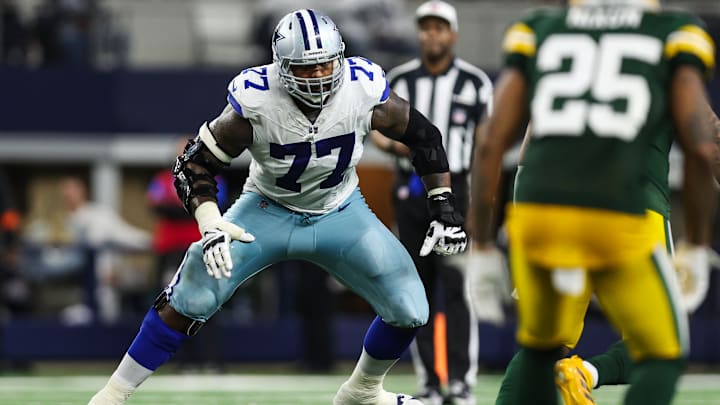The NY Jets had one of the worst offenses in modern NFL history last season. The combination of abysmal quarterback play, a disgustingly injured offensive line, a bad receiving corps, and a terrible offensive coaching staff paved the way for historical ineptitude on offense.
The Jets finished with a bottom-10 third-down offense in NFL history, ranked among the lowest offenses EPAs in the 21st century, and averaged a ridiculously low 268.6 yards per game.
By all metrics, the Jets had one of the worst offenses we've seen in the modern NFL last season. However, the Jets' offensive ineptitude in 2023 could actually save the team 2024 cap space.
How? It all relates to the incentive-laden contract the Jets just handed Tyron Smith in free agency. Smith's deal carries only $6.5 million in guarantees, but with incentives that could climb as high as $20 million.
Here's how the Jets' offense comes into play.
How the NY Jets could save 2024 cap space because of their inept 2023 offense
There are two types of incentives on an NFL contract: Likely To Be Earned (LTBE) and Not Likely To Be Earned Incentives (NLTBE). LTBE incentives count against the 2024 cap in most cases, while NLTBE incentives do not.
An incentive is declared LTBE if it was accomplished the previous season. So in Smith's case, if the Jets included an incentive for him to play 10 or more games, it would be considered LTBE since he appeared in 13 games last season.
The Jets would obviously prefer to include as many NLTBE incentives in Smith's contract as possible to push money into the future (NLTBE incentives count against the following year's cap if they are reached).
But from Smith's perspective, he understandably wants incentives that are easy to reach. So, what's the middle ground? How can the Jets include NLTBE incentives that, contrary to their name, are actually likely to be reached?
Instead of tying Smith's incentives to player performance, Pro Football Focus' Brad Spielberger has a brilliant idea — and it's one the Jets likely thought of as well.
Guessing Jets are able to keep all/almost all the incentives NLTBE (wouldn’t be on 2024 cap initially) by tying them to team improvement in whatever offensive metric(s) they were worst in in 2023 (many options) https://t.co/ZOQl0aBzVC
— Brad Spielberger, Esq. (@PFF_Brad) March 16, 2024
As Spielberger notes, the Jets could tie Smith's incentives to team performance instead of player performance. Since the Jets' offense was so abysmal last season, that should, in theory, make those incentives each to hit in 2024.
For example, the Jets could include an incentive where Smith receives a certain amount of money if the Jets' offense ranks top-30 in yards per game. Since the Jets ranked 31st in YPG last season, that would be considered an NLTBE incentive, meaning it wouldn't count against their 2024 cap.
This is the best of both worlds. The Jets get to save 2024 cap space, while Smith receives an incentive he's almost guaranteed to hit — and it's all possible because of how bad the Jets' offense was last season.
If the Jets' offense was mediocre last season, those incentives would be harder for Smith to reach, making the contract less valuable to him. Nathaniel Hackett knew what he was doing all along. He wasn't leading a bad offense because he was bad at his job — he was just trying to save the Jets' cap space.
Of course, the full details of Smith's contract have not been released at the time of writing, so we don't know for sure if this is the route the Jets took. But as Spielberger notes, it would certainly be wise for the team to have explored this option.
The NFL salary cap has dozens of weird quirks, and this one, in particular, might reward the Jets for their offensive ineptitude. Thank you Nathaniel Hackett and Zach Wilson, I guess?
